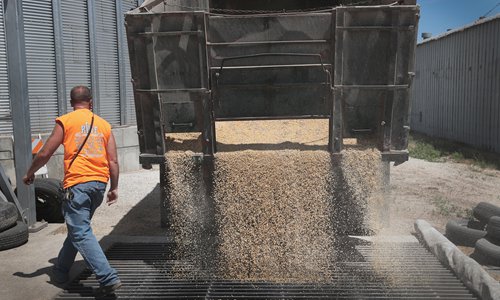China sends implicit warning to US on farm imports
By Ma Jingjing and Yin Yeping Source:Global Times Published: 2020/6/2 18:23:40

A man unloads soybeans at a Ruff Bros. Grain elevator in Illinois, the US. Photo: VCG
Beijing could be sending Washington an implicit warning that it could halt purchases of US agricultural products, in case the Trump administration imposes harsh sanctions on the Hong Kong Special Administrative Region (HKSAR) over the national security legislation by China's National People's Congress.
Zhang Xiaoping, country director for China at the US Soybean Export Council, told the Global Times on Tuesday that Chinese companies are still purchasing US soybeans in line with market rules, unaffected by the diplomatic tensions between the two countries.
"This is proved by Chinese firms' purchases of newly harvested US soybeans on Monday," he said.
A source close to a Chinese state-owned enterprise in the soybean trade confirmed to the Global Times on Tuesday that the company is still importing soybeans from the US, though the person declined to elaborate.
The developments contradict Western media reports on Monday saying that China has told state-owned trade firms to halt purchases of US agricultural products including soybeans, corn, cotton and pork.
A Beijing-based Chinese analyst who declined to be named told the Global Times on Tuesday that this could be Beijing's "policy ambiguity" tactic, warning the White House that the country could retaliate by halting imports of US agricultural products, and hitting Trump's farmers electorate, if he chooses to sanction Hong Kong.
The implicit warning came as US President Donald Trump said Friday that he will start to eliminate preferential treatment for the HKSAR.
Cao Heping, an economist at Peking University, told the Global Times that the US is bluffing because an end to special trade treatment for Hong Kong "will have almost no impact on the city", given that Hong Kong only imported $490 million worth of US products in 2019.
"However, if the Trump administration continues to put pressure on bilateral trade with China by adopting administrative measures, China will come up with more sanctions," he said.
Sun Beiguo, dean of the Beijing-based Chuanglian Agricultural Sciences Institute, told the Global Times on Tuesday that if the US does not fuel tensions, China's imports of American soybeans may hit 50 million tons this year.
"But we don't have to buy US soybeans, we could shift to Brazil and Argentina if China-US conflicts escalate," Sun said.
Official data showed that Brazil is the largest foreign source of soybeans for China with 65 percent of the total, followed by the US at 19 percent and Argentina at 10 percent.
Earlier this year, US soybean exports to China were affected as Brazilian soybeans became more attractive due to its currency depreciation, but some Chinese buyers seized opportunities to buy US soybeans over the past two months, Zhang said.
"The US should cherish its trade with China at a time when domestic US violent protests and the COVID-19 outbreak have hindered its economic recovery," Cao said.
Deutsche Bank on May 12 adjusted its US GDP forecast for the second quarter to a contraction of 40 percent, down from a previous prediction of a 13 percent slump, considering "muted rebounds in business spending and trade."